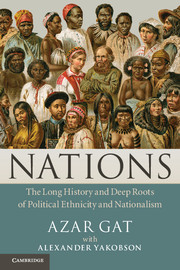Book contents
- Frontmatter
- Contents
- Acknowledgments
- 1 Introduction: is nationalism recent and superficial?
- 2 The evolution of kin–culture communities
- 3 From tribes to statehood
- 4 Premodern ethne, peoples, states, and nations around the world
- 5 Premodern Europe and the national state
- 6 Modernity: nationalism released, transformed, and enhanced
- 7 State, national identity, ethnicity: normative and constitutional aspects
- Conclusion
- Notes
- Index
Conclusion
Published online by Cambridge University Press: 05 February 2013
- Frontmatter
- Contents
- Acknowledgments
- 1 Introduction: is nationalism recent and superficial?
- 2 The evolution of kin–culture communities
- 3 From tribes to statehood
- 4 Premodern ethne, peoples, states, and nations around the world
- 5 Premodern Europe and the national state
- 6 Modernity: nationalism released, transformed, and enhanced
- 7 State, national identity, ethnicity: normative and constitutional aspects
- Conclusion
- Notes
- Index
Summary
Modernism, perennialism, and primordialism, the accepted and largely ossified categories in the study of the nation and nationalisms, are all in need of reformulation and synthesis. Although radically transformed and enhanced by modernity, nationalism, the rough congruence – and connection – between state and culture, people or ethnicity, was not invented in the modern era. The national state has been perennial in human history since the beginning of statehood and as one of its major forms, alongside petty-states and empires; and yet human history itself is but a blink of the eye compared with the vast time span of human prehistory, when no states or nations existed. Indeed, nations and nationalism are not primordial; nonetheless, they are rooted in primordial human sentiments of kin–culture affinity, solidarity, and mutual cooperation, evolutionarily engraved in human nature. These attachments, permeating social life and extending beyond family to tribe and ethnos, became integral to politics when states emerged.
Powerfully resonating with the post-1945 climate of ideas and normative atmosphere, modernist precepts have been the most influential, and most misleading, in the current study of the nation and nationalism, exaggerating genuine major developments ad absurdum. They thus call for special attention. Losing sight of the ethnonational phenomenon’s deep roots, modernist and instrumentalist theorists have regarded the nation and nationalism as a pure sociohistorical construct, if not completely artificially contrived. As a result, they have misinterpreted the ethnonational phenomenon’s historical trajectory and have either remained confounded by, or turned a blind eye to, its highly explosive potency, so evidently one of the strongest forces in human history.
- Type
- Chapter
- Information
- NationsThe Long History and Deep Roots of Political Ethnicity and Nationalism, pp. 380 - 387Publisher: Cambridge University PressPrint publication year: 2012



